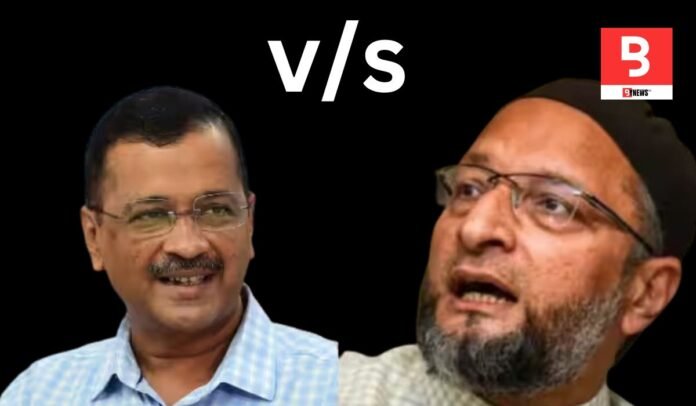Sunderkand Showdown: Dive into the political battlefield as Kejriwal’s unexpected spiritual revelation in the Sunderkand sets off a frenzy, prompting a fierce response from Owaisi. Uncover the exclusive details of this dramatic clash, where spirituality meets politics in a headline-grabbing showdown.
Ayodhya is ready for the inauguration of Ram Temple. Amidst the preparations going on in full swing for the consecration ceremony of Ram Lalla, the Chief Minister of Delhi participated in the Sunderkand recital held at the ancient Shri Balaji temple. Regarding Sunderkand lesson, All India Majlis-e-Ittehadul Muslimeen (AIMIM) Asaduddin Owaisi took a dig at Aam Aadmi Party (AAP) national convenor Kejriwal and said that there is no difference between him and BJP. You retaliated against this.
On the statement of MP Owaisi about small recharge, Delhi government minister and AAP leader Saurabh Bhardwaj said that God should bless him (Owaisi). He said, ‘I don’t think there is a need to respond to what he (Owaisi) said. I will pray to Lord Hanuman to bless Owaisi Sahab also. No party should have any objection to Sunderkand recitation.
What is Sunderkand?
Sunderkand, a chapter from the epic Ramayana, narrates the heroic journey of Lord Hanuman to Lanka in search of Sita. Composed by Sage Valmiki, it symbolizes unwavering devotion, courage, and the triumph of good over evil. The recital holds profound significance in Hindu traditions, fostering spiritual connectivity and invoking blessings.
Political Undertones: Owaisi’s Critique and AAP’s Response
Amidst the harmonious rendition, political ripples emerged as AIMIM’s Asaduddin Owaisi took a dig at AAP’s Kejriwal, alleging alignment with the BJP. In a retaliatory response, Delhi government minister and AAP leader Saurabh Bhardwaj dismissed the claims, emphasizing the universality of spiritual practices. Bhardwaj stated, “No party should have any objection to Sunderkand recitation.”
A Unifying Prayer: Blessings Beyond Boundaries
Despite political exchanges, Bhardwaj extended a gesture of goodwill, stating, “I will pray to Lord Hanuman to bless Owaisi Sahab also.” Sunderkand, with its universal themes of devotion and righteousness, transcends political affiliations, fostering a sense of unity and shared spiritual values.
In the midst of bustling political dynamics, the spiritual harmony found in the recitation of Sunderkand serves as a reminder that, beyond the realm of politics, there exists a thread that connects individuals in their pursuit of higher ideals and divine blessings.

